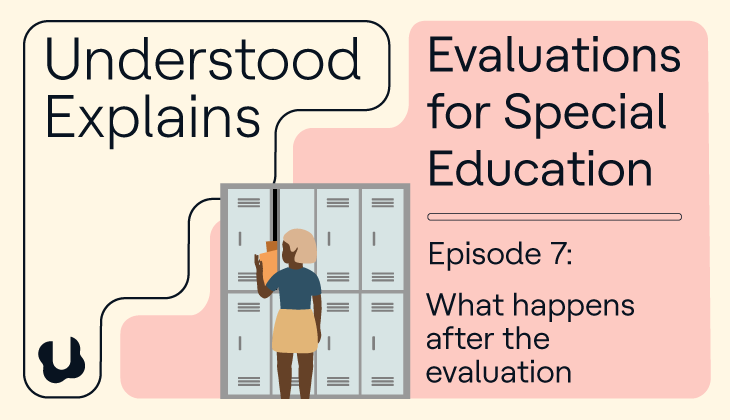Stay in the know
All our latest podcasts delivered right to your inbox.
Adverse impact. Eligibility determination. IEPs. 504 plans. What are these things? And what do they have to do with evaluations? This episode of Understood Explains covers how school evaluation teams decide which kids need which kinds of support.
Host Dr. Andy Kahn is a psychologist who has spent nearly 20 years evaluating kids for public and private schools. His first guest on this episode is special education teacher Lauren Jewett. They’ll explain:
What happens at an eligibility determination meeting
How schools decide who qualifies for an Individualized Education Program (IEP)
What other kinds of support can help struggling students
Andy’s second guest is parenting expert Amanda Morin. They’ll share tips on what to say to your child after an eligibility meeting — and what not to say.
Related resources
Episode transcript
Leslie: Hi, I'm Leslie from Little Rock, Arkansas. In second grade, within the first couple of weeks, it was decided by these evaluations that Sarah needed speech therapy, occupational therapy, and I think physical therapy. She wasn't holding her pencil right, she had her wrist turned the wrong way, she had some speech impediments. And then we would receive the results of that and eventually she reached her milestone and those kind of fell away. But she did always receive accommodations for reading and math, and that was evaluated every semester. And that IEP followed her from second grade until she graduated from Central High School with a 3.5 grade point average that last semester.
Andy: From the Understood Podcast Network, this is "Understood Explains." You're listening to Season 1, where we explain evaluations for special education. Over 10 episodes, we cover the ins and outs of the process that school districts use to evaluate children for special education services. My name is Andy Kahn, and I'm a licensed psychologist and an in-house expert and understood.org. I've spent nearly 20 years evaluating kids for both public and private schools, I'll be your host.
Today's episode is about what happens after the evaluation. All the testing and data collection is done, the evaluation report is done. The next step is a real mouthful; it's called eligibility determination. This is when the evaluation team meets to decide if the student is eligible for special education. Today's episode is going to cover three key things: how the eligibility determination process works, what kind of supports schools offer to students — including what's available to kids who don't qualify for special education — and what to say to your child after an eligibility meeting, and what not to say. But first, let's hear another parent story.
Jennifer: Hi, my name is Jennifer and I live in Atlanta, Georgia. So, in the eligibility report, they enter all of the testing information into this program, and it automatically determines which categories the student could potentially qualify under. And so, one of those categories for my son was like, brain something, I can't remember. I wish I could remember what it was called. But it was something that was like crazy. And I was like, "Wait a minute, what?" It's just that even in the meeting, they'll tell you, you know, "This is automated, and just because it like flags it doesn't mean that we're really considering it, but we do have to talk through it."
Andy: What Jennifer was just describing can be a jarring part of the eligibility determination meeting. This is the part of the meeting when the team goes through a dozen or so disability categories to see if the child qualifies for special education under any of them. And folks, just so you know, the name of the category that Jennifer was trying to remember is called traumatic brain injury. We're going to talk more about the disability categories and other key parts of the eligibility determination process.
To help me explain all this, I want to bring in my first guest. Lauren Jewett is a special education teacher at an elementary school in New Orleans. She's also a special education case manager, which means she's been a part of a lot of evaluation teams. She's also a national board-certified teacher, and an Understood teacher fellow. Lauren, it's so great to have you here with us today. How're you doing?
Lauren: I'm good. Thank you for having me on this show.
Andy: So, Lauren, after an evaluation, the school team holds an important meeting called eligibility determination. This is where the team uses the evaluation report to help decide if the student qualifies for special education. So, if the student qualifies, then the next step is to develop an IEP, which stands for Individualized Education Program. So, this part of the process, determining eligibility for special education and then developing an IEP, this is all covered under IDEA. Lauren, can you remind everyone what IDEA stands for?
Lauren: IDEA is the federal special education law that stands for the Individuals with Disabilities and Education Act. And it covers all the ways that a student would get into special education for their servicing, and all the different disability categories that they could qualify under. And then after the evaluation period or process, what they could get, you know, in terms of an IEP and what that looks like and all the legal procedures with the student.
Andy: Gotcha. So, all states have to follow this federal law, but, you know, different states may handle eligibility determination in slightly different ways. I'm located in the state of Maine. So, in Maine, we determine eligibility, and we actually use a very specific form for eligibility determination, so we use what we call an adverse impact form. The purpose, really, is to see whether someone is eligible or not for services, based on all of the data that we have. We use our adverse impact form and we go through a series of checklists. But in different states, it's done in different ways. How do you guys do that in Louisiana?
Lauren: So, our process is covered by a state bulletin; we have a state bulletin called Bulletin 1508, and Bulletin 1508 covers all of the ways that people appraisal and the school psychologists can qualify a student for the different disability categories. So, IDEA, which we talked about, that law has a bunch of different disability categories. And so that bulletin, 1508, outlines all of the different procedures that one would have to look at and use to determine what category or what classification the student would qualify under.
Andy: OK, so taking a look at the big picture, you're talking about state regulations that make the evaluation team fill out checklists and answer very specific questions. And you have to do all this to determine if a child meets the IDEA’s two most important requirements to be eligible for special education. Number one, the child has to have a disabling condition, and number two, that disabling condition must adversely impact the child's education. So, when we talk about adverse impact, like an example, let's say we're looking at a specific learning disability, if a child was let's say, half a grade level behind, would that typically be adverse impact, or would that not be enough?
Lauren: We usually, you know, if I'm thinking for an example of like, specific learning disability, you know, in our state, in order to qualify for a specific learning disability, there has to be an area of strength, and then an area where the student is, you know, struggling. And then they look at standard deviations below a mean, or above a mean.
Andy: OK, so I'm going to decode some of this information. Because again, it's really, really helpful. When we talk about things like standard deviations, what we're talking about is, when you're comparing a child's piece of information to a large group, and how far they fall from that large group, if it's far enough away, that would be something that might be considered adverse impact, meaning adverse impact really refers to is the child able to do what they're needing to do, like other students of their age or grade level? The adverse impact would be "I can't do this because I have dyslexia," or they can't focus and engage and participate in a way that would be manageable for them because of severe ADHD or some other disabling condition. So adverse impact's really about there's a functional thing that isn't happening. You could have a diagnosis, but not necessarily show adverse impacts. And that can be confusing for people. How do you go about explaining adverse impact to your families if you're talking to them about that?
Lauren: Yeah, I think when I'm thinking about adverse impact — especially when I look to write IEPs, right? — we think about a disability impact statement, which is kind of similar, you know, like, how is the disability impacting the student in class? So, for example, if the student has dyslexia, how is that affecting what they're doing in class across different subjects all day? So, if the student has a specific learning disability in reading, and they are two to three grade levels behind, thinking about, OK, this is the student's disability, this affects their ability to read on grade level texts that are going to be provided to them and given to them in class. So not just in reading class, but in all those content areas that have a lot of academic domain vocabulary, a lot of reading comprehension needs.
And so, when I break that down, I'm trying to give more applicable information to a family, you know, because again, there's so much jargon. So then let's, like I say, let's take a step back and look at how is this going to look like in the classroom? How is this affecting them on a day-to-day basis?
Andy: Gotcha. So really, adverse impact is important because you're talking about the how, right? How do we know that this child isn't doing as well as we hoped that they would do because of this disabling condition? OK, and that's really important for families. So, when we talk about the information being considered, who's typically present at the meetings where you're going over the evaluations and making that eligibility determination?
Lauren: It usually would be the school psychologist or educational diagnostician — those are the people who maybe conducted the different set of tests and assessments that were given to the student, or the person, you know, who wrote and did the comprehensive report — you're gonna have the parent there, the parent may have another family member there, maybe an advocate. But you could have a special education coordinator there, the teacher, other members who contributed to the report, or additional teachers. You know, if it's a reevaluation for a student that's already been in special education, then it is likely that the special education teacher may be there because that student has already been receiving services.
Andy: That was super helpful, Lauren. When we talk about the disability categories, we traditionally talk about the 13 disability categories in IDEA. I understand that in certain states, we can actually see as many as 14, or even 15 categories. The categories that I most commonly see us use in schools are specific learning disabilities, speech and language impairment, other health impairment, and autism. Less commonly, we might see intellectual disabilities, for example, or deaf-blindness.
I'd like to shift our conversation a little bit. So, Lauren, when we have a child who's found eligible for special education services, and they meet those two requirements, they've got their identified disability, they meet the adverse impact, adverse effect criteria, what happens next? Let's assume we're at that next meeting.
Lauren: Yeah. So, the next step would be for the IEP team to convene and meet, and look at the information that's been provided in the evaluation, and then create an IEP for the student. So oftentimes, you know, these evaluations are very long. And you know, when I receive those evaluations, I have to read them and go through everything and think about what makes sense for the student. But the main thing in that meeting, the IEP development, is really taking that information from the evaluation, and making sure that it's reflected in the spirit of the document.
Andy: Yeah. So, let's pause on that for a minute. You're talking about how you can make sure the IEP reflects what's in the evaluation report. How can parents help with this? Like, what role can parents play in developing the IEP?
Lauren: I always encourage families to, you know, as we start those meetings, those IEP meetings, I always say, "There's going to be a lot of information. You know, stop if you have questions." And also like, every page that we go through, whoever is leading that part of the meeting, we have the person who's leading that part, like stop and ask the parent like, ''How does that sound? Do you have input? Do you have anything you want to add?'' You know, it just depends. But I always, you know, tell parents ahead of time to, I explain — especially if it's their first meeting ever — I just say, you know, like, ''Bring your ideas of what you would like to see. What do you hope for your child to get out of this? What are your concerns? What's not currently working?''
Andy: So, Lauren, what if the child has a disability, but isn't eligible for special education? What are we gonna do in a situation like that? Because if a child's not getting an IEP, how do you explain that to a parent?
Lauren: In that conversation, you know, if they're not going to have an IEP, sometimes we do try to provide supports in the classroom through a 504 plan. So, a 504 plan comes from section 504 of the Rehabilitation Act. And that's a civil rights law. So, a 504 plan is more like an accommodation plan that a student might have in the general education class. It's not specially designed instruction, it could be the student gets some extra time when they're doing assignments, it might be specified seating; it doesn't have as many accommodations or modifications listed as an IEP because an IEP is going to be more situated and individualized for the student on their goals.
And then it is also allowing, like I said, specially designed instruction modifications, you're not going to see that as much with a 504 plan. A student could have a 504 plan for a short period of time as well. Maybe they break their arm, and they need a scribe or need some different assistance in class for that period of time. So, it could range in different situations. But again, it's different because it's not, you know, listing a bunch of different goals and related services like an IEP would.
Andy: At the eligibility determination, is a common outcome that the team decides that the student qualifies for a 504? Or does that happen at a different meeting if they don't qualify for services under IDEA?
Lauren: It may be a separate meeting; maybe the team comes together, they go over the evaluation — no exceptionality is found. And so, we talk as a team and say, well, you know, sometimes teachers will be indicating that they still have concerns about the student, and how they're going to be able to do everything in class without certain supports that are formalized. So, you know, maybe their recommendation would be a 504 plan. And so, it could be a separate meeting that happens with maybe not all the same people at the table, but definitely the teacher and the parent, and the person who's responsible for, you know, handling the 504 plans, because that's a whole other system, you know, a 504 plan versus the IEP. The team looks at what accommodations would be appropriate for the student. And it could be accommodations like the student gets some extra time on assignments and tests, maybe they get a small group or individual testing because they need to focus.
So those are some examples of things that we put, you know, in 504 plans, and we have students that have 504 plans and still get those accommodations when it comes to standardized and state testing, they still get those things. So, it's not like they only get them in the classroom, and then they don't get them in other things. It goes through all the different situations and circumstances that the student could have those supports.
Andy: So, you mentioned that for kids who don't qualify for an IEP, sometimes you try to provide a 504 plan. What about kids who have a disability, but don't have an IEP or a 504? What are some of the things a school can do to help support those kids?
Lauren: You know, a student that has an IEP, right? They have specific rights that are outlined, but every kid has all different specific learning needs, whether they have that IEP or not. So, establishing a mindset of how do we make the classroom environment, as well as the learning materials more accessible? There's things that students might need from time to time, and we just have to provide them and make sure that there's still supports that are in place there that may not need to be supports that are there long-standing.
But we know we don't just like, you know, not give supports as a teacher, if we see a student struggling, we want to help. And so, I think reframing it is like, "OK, well, just because they have an IEP, only those groups of students can get help." No, like all students can get help. So, I think that there's still a way to design supports within a classroom or for students, whether they have that IEP or not.
Andy: So, Lauren, I want to circle back to some really good advice you gave about encouraging parents to come to these meetings ready to ask questions and make suggestions. And listeners, one thing that can help you do this is to make sure you get a copy of your child's evaluation report before you go to that meeting. You have a right to see that report in advance. We've got a lot more information in episode three about your evaluation rights.
But I want to make sure you know that you have this right in particular, because it can be really helpful to look at the report ahead of time, think about what questions you want to ask and what suggestions you want to make, so you can be an active member of the team during the eligibility meeting. Lauren, thanks so much for being with us today. I've really appreciated your input and it's been so awesome to learn about how you do your work down in Louisiana.
Lauren: Yeah, thank you, I really enjoyed this conversation.
Michele: My name is Michele and I live in the Bronx, New York. My oldest son was not given a diagnosis because they deemed him not eligible for special education services, because they basically said there's nothing, there's no real issue. He's just very creative, his mind needs to be stimulated, but they couldn't justify providing services. So, he was never given an IEP, he was never in special education.
Andy: So, we've been talking about what adults can expect after an evaluation, an IEP, a 504, or informal supports. But what can adults say to kids about these things? And how are kids likely to react? So, to help me unpack all this, I'd like to bring in my next guest, Amanda Morin, she co-hosts Understood's "In It" podcast, about the joys and frustrations of parenting kids who learn and think differently. She's the mom of two kids who learn differently, and she has also worked as a classroom teacher and as an early intervention specialist. Amanda, welcome.
Amanda: Thank you so much, Andy. And as you know, I've also attended a number of IEP meetings on my own too, right? As a parent.
Andy: You've been at this table. Yeah. So, let's jump into this a bit. I mean, you know, what kind of things can parents talk to their kids about when we're talking about getting an IEP or a 504, or some of these supports?
Amanda: So, I think the first thing is to know that kids have so many reactions to things, right? The same way we as parents have reactions to things, your child's gonna have a whole bunch of reactions to things, and it may not be what you expect, right? For some kids, it may be relief, "OK, phew! We're going to sit down and finally have this conversation. And maybe I'm going to feel better at school, maybe I'm going to feel like I can really do this, there's going to be more help." And a lot of parents don't expect that reaction. And so, as a parent, I think being open to whatever your child's reaction is, really matters.
So, to be able to say to them "How do you feel?" instead of saying to them "Do you feel sad? Do you feel angry?" Like, don't put those emotions in their minds until they tell you what's on their minds. And I think that's important, too.
Andy: Yeah. So, you're talking about their emotions relative to the reaction to all the things they're learning, which is a ton of information. And I think it's really important — you mentioned — when you ask about how they're feeling, the open-ended question, right? "What are you feeling? What's it feel like?" I mean, and I think for younger kids, they may struggle in expressing that. And yeah, I think you made a great point that you're not always going to know what to expect, because they may say things that just shock you or surprise you, or please you, I don't know.
Amanda: Or they may not even care, right? Like sometimes kids don't care the way we do as parents, and we're like, "What? This is such a big deal." And your child's like, ''No, not really. Not that big a deal.'' And so, I think you can follow their lead in that situation and be like, "Oh, OK. Well, this is a big deal for me. And I'm sorry to assume that it was a big deal for you." And I don't mean that in a sarcastic way, I mean like sincerely to be able to say to your child "Oh, it feels like a big deal to me. I didn't mean to assume that it was a big deal for you too." And then sort of move on from there.
Andy: For sure. For sure. So, let's say that your child's starting to express some of those, you know, unhappy emotions, that anger, or saying, "Well, this isn't true" or are feeling sort of down about it. Where do you go? How do you really navigate that?
Amanda: That one's really hard. I mean, I'm just going to be honest, and say it's really hard. Because what it does is, your child is all of a sudden hearing about themselves in a totally different way, right? They're hearing about themselves, especially because unfortunately, a lot of evaluations are around looking for weaknesses, right? Looking for deficits is the word that comes up a lot. And I think the way to handle that with a child is to say, "Of course you're angry; of course you're sad. Of course this tells you about yourself in a way you hadn't thought about yourself before. But you're still you, you know. You haven't changed; the paperwork says one thing, it's just talking about you. It's a snapshot, it's a picture of you, but you're still the same person you were. And what this does is allow us to talk to the school about whether or not you're eligible for help, for additional support, for ways to make you feel like you are more you than you've ever been before."
Because when kids have the support they need at a school, whether it's through an IEP or a 504 plan or informal accommodations and support, they really do feel like they get to be more of their full selves because they get to show what they know, right? In that moment, you can say "You're angry because you're not able yet to show what you know." But I think it's OK to just say, "You feel this, and we can sit with it. It's really hard, right? It's really hard." And they may be angry at you.
And I think it's important to know that because you're the person delivering the information. You're the person who may have started this process. You're the person who's talking to them about this. If they're angry at you, that's hard. But I think you need to redirect it. And oftentimes that's about "I hear that you're angry, and I really want to talk to you about this. I'm not able to have this conversation while you're yelling at me." Right? ''So, we're gonna take a moment. When you can talk to me calmly, we can have this conversation.''
Andy: Amanda, this is amazing advice. And I'm really glad we could do this today. Thanks so much for being here.
Amanda: Yeah, thanks for having me.
Andy: So, we've talked about how schools determine who is eligible for special education, and other ways schools support struggling students. We've also talked about how to ask open-ended questions to help your child talk about how they're feeling. If there's one thing you can take away from this discussion, is that you can play an active role in what happens after the evaluation. So don't be afraid to ask lots of questions until you understand what's happening and why. As always, remember that as a parent, you are the first and best expert on your child.
In our next episode, we'll focus on the difference between private and school-based evaluations and why some families choose to get one or the other or both. We hope you'll join us.
You've been listening to Season 1 of "Understood Explains" from the Understood Podcast Network. If you want to learn more about the topics we covered today, check out the show notes for this episode. We include more resources as well as links to anything we've mentioned in the episode. And now, just as a reminder of who we're doing all this for, I'm going to turn it over to Abraham to read our credits. Take it away, Abraham.
Abram: "Understood Explains" is produced by Julie Rawe and Cody Nelson, who also did the sound design for this show. Briana Berry is our production director. Andrew Lee is our editorial lead. Our theme music was written by Justin D. Wright, who also mixes the show. For the Understood Podcast Network, Laura Key is our editorial director. Scott Cocchiere is our creative director. Seth Melnick is our executive producer. A very special thanks to Amanda Morin and all the other parents and experts who helped us make this show. Thanks for listening and see you next time.
Andy: Understood is a nonprofit organization dedicated to helping people who learn and think differently discover their potential and thrive. Learn more at understood.org/mission
Host

Andrew Kahn, PsyD
is a licensed psychologist who focuses on ADHD, learning differences, anxiety, autism spectrum disorder, behavior challenges, executive function, and emotional regulation.
Latest episodes

July 13, 2022
How do schools evaluate kids for special education? For a quick preview, listen to the trailer for Season 1 of the Understood Explains podcast.

July 13, 2022
Is your child struggling in school? Are you wondering what supports might help? Get an overview of how schools evaluate kids for special education.
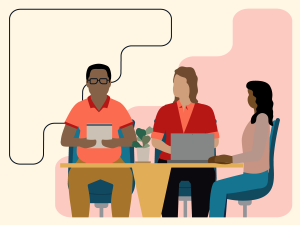
July 13, 2022
How do schools and families decide if a child needs an evaluation? Get tips to help decide if now is the right time or if you should wait.
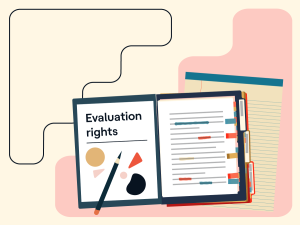
July 13, 2022
What rights do families have in a school evaluation? Learn how special education law protects your rights during the evaluation process.
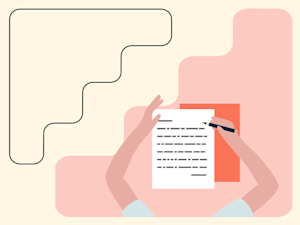
July 13, 2022
School evaluations are free — and you can ask for one at any time and for any reason. But the details you include can make a big difference.

July 13, 2022
What happens during the evaluation? And what role do families play? Learn how to help shape the evaluation plan and help your child get ready.
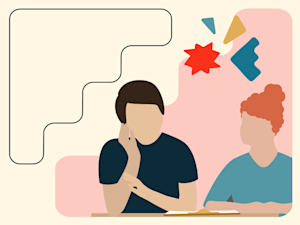
July 13, 2022
What do all the numbers mean in your child’s evaluation report? This episode explains key terms and gives tips to help make sense of the results.

July 13, 2022
Why do some families pay for private evaluations when the ones at school are free? Find out in this episode of the Understood Explains podcast.
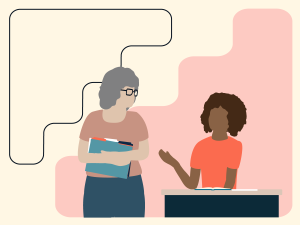
July 13, 2022
How often do kids need to be reevaluated? Find out what to do about losing IEP services and how reevaluations can help teens get ready for college.
